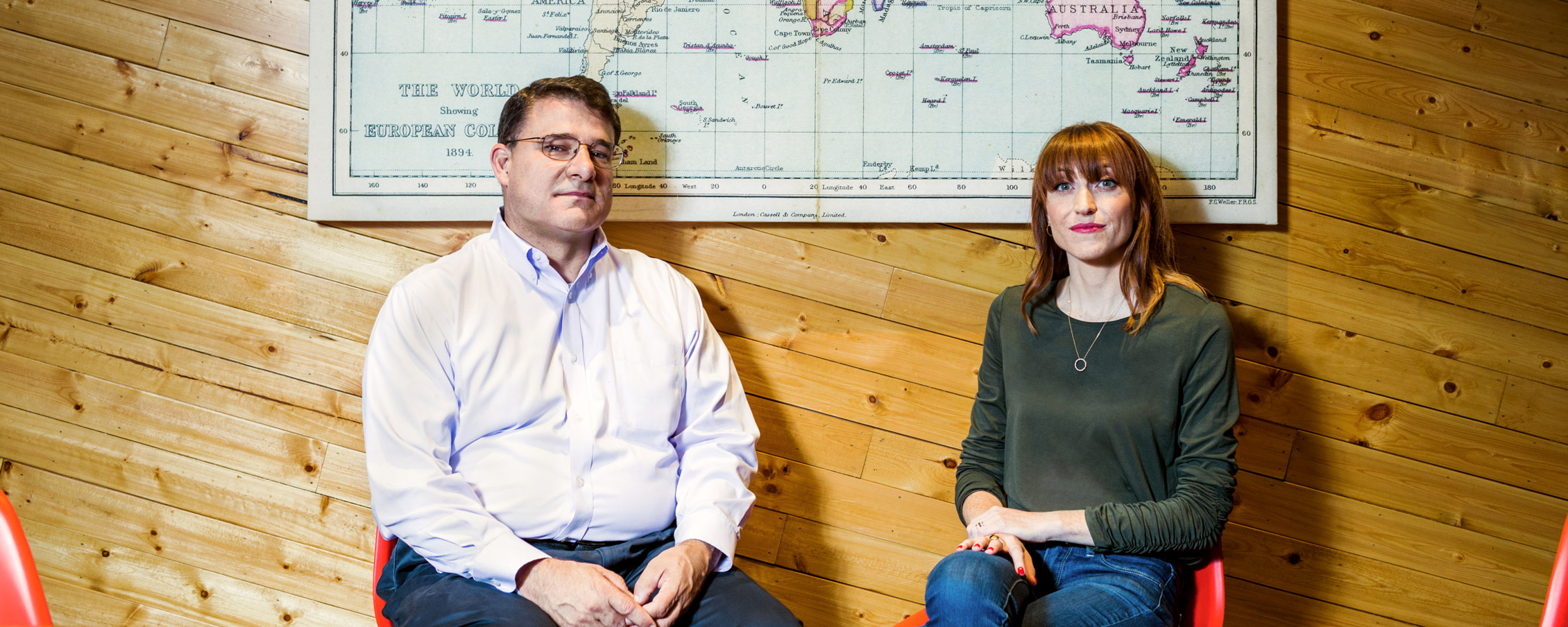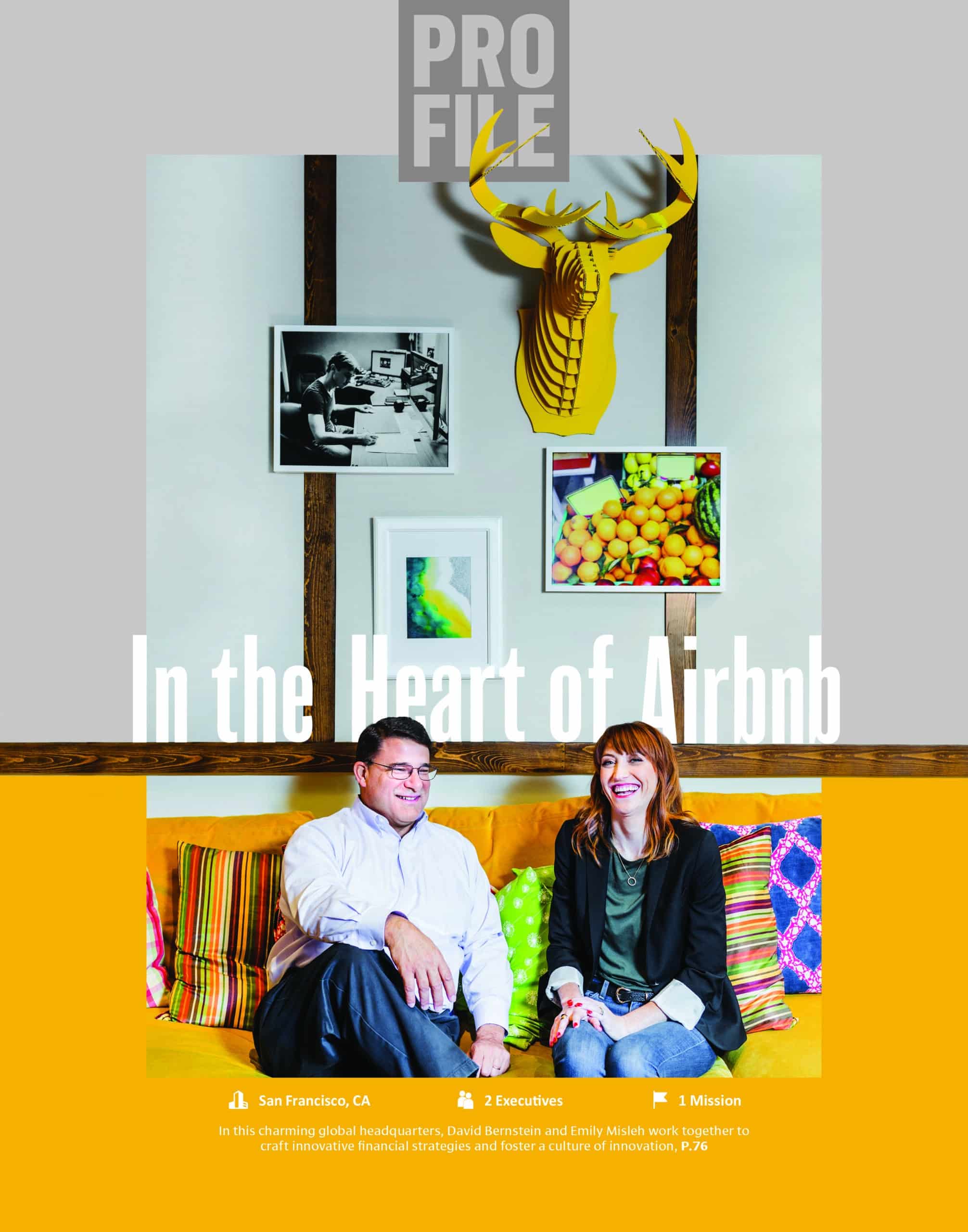
Since its inception in 2008, Airbnb has soared to staggering numbers that have completely transformed the travel and lodging industry. There are more than four million listings in more than 191 countries worldwide. And more than two hundred million guests have stayed in an Airbnb.
Helping to manage the company’s growth, support ongoing innovation, and ensure that the finance department acts as an integral and collaborative business partner are David Bernstein, chief accounting officer and controller, and Emily Misleh, finance senior manager, special projects. Although their titles may not suggest it, on any given day, they can be working on tools, processes, or infrastructure that help address the quality and reliability of Airbnb’s community platform, reinforce the accuracy and utility of transactions on the company’s online marketplace, or ensure that its technology is scalable to support its global workforce.
Instead of asking employees to remain boxed into a single role, the company encourages them to act as “cereal entrepreneurs,” who are always looking for ways to innovate, improve, and survive—just as Airbnb’s founders did in the company’s early days by selling designer boxes of cereal, such as custom-made boxes of “Obama O’s,” to fund their fledging start-up.

“In many organizations, the finance staff is often in the position of simply pointing out risk,” Misleh explains. “We do that, but we also have a mandate to figure out how to break new ground and turn great ideas into real solutions.”
Bernstein notes that finance was set up as an advisor and active business partner from the beginning. “To stay focused on that priority, we always start by getting a comprehensive understanding of the rationale for any action before figuring out what needs to be done, let alone how to do it,” Bernstein says.
That different approach is something that resounds throughout the organization and even with Airbnb’s partners. “David and Emily’s leadership has helped make it possible for finance to effectively and rapidly optimize its processes and systems over the past few years,” says Neil Smith of CrossCountry Consulting. “Equally impressive is the finance team’s commitment to continuous improvement through a collaborative approach. This should help ensure that the department will continue to find ways to add value to the business as the company evolves.”
It’s all part of Airbnb’s mission of creating a world where anyone can belong anywhere through a single application that provides unique, community-based travel customized for each user’s travel needs. So, in addition to arranging accommodations, the company’s platform has integrated capabilities for making restaurant reservations. It is rapidly expanding its offerings of local experiences: highly curated activities that range from meditative hikes to cooking classes, or anything else that reflects the authentic passions of locals who wish to share those experiences, whether it be a local or an out-of-town traveler.

“More than half the people booking experiences in many of our cities are local,” Bernstein says. “I grew up in San Francisco but had never toured the murals in the Mission District before taking an Airbnb experience. It was a wonderful, unique experience and having someone speak to them in a meaningful and personal manner was powerful and memorable.”
The finance team has also supported the pilot of two new features related to the company’s highly complex payments business, which handles billions of dollars in multiple currencies through a global network of payment processors: Group Payments, which enable accommodation fees to be billed separately to individuals sharing a booking, and Partial Pay, which allows for a 50 percent deposit at the time of an advance booking instead of full payment, relieving some of the financial burden of paying the entire booking fee in advance of the trip.
Although changes such as these greatly increase user flexibility, they require tremendous collaboration between engineering, business systems, treasury, tax, accounting, and countless other teams. Responsibilities for handling that cross-coordination fall to Misleh, who has established a stellar record for assessing needs, creating implementation plans, nurturing buy-in from everyone involved, and executing flawlessly.
“We always start by getting a comprehensive understanding of the rationale for any action before figuring out what needs to be done, let alone how to do it.”
David Bernstein
For example, in 2016, Misleh helped launch a standardized global procurement system. But she knew the term procurement would sound too traditional to Airbnb’s forward-thinking employees and would automatically symbolize a slow, bureaucratic process. To address that problem, she named the rollout Buy@.
“We did extensive peer research and crafted a story that presented Buy@ as an opportunity, not new rules that would slow things down,” Misleh says. “We worked collaboratively and flexibly so that the implementation accommodated the needs of each group.”
Bernstein points out that this is typical of Misleh’s approach. “She listens to input and then formulates solutions that provide needed controls but reflect the realities of the organization,” he explains.
That strategy, which recognizes and respects different local customs, has been instrumental in gaining cooperation from different global units within Airbnb. When streamlined reporting processes were introduced, Misleh developed close relationships with the likes of the company’s BRIC (Brazil, Russia, India, and China)market, which were accustomed to completely different holiday schedules, banking regulations, and compliance guidelines. However, after identifying their priorities, local practices, and motivating factors, Misleh succeeded in updating
their processes.
Worldwide, her efforts to consolidate accounting functions produced millions in savings and reduced accounting closing from twelve days to six.
Bernstein and Misleh have a successful partnership built on trust, candor, and different, but complementary styles. He describes her as an “outstanding communicator and extremely quick processor of information who is extraordinarily bold—often plowing a new path before I’ve even decided we need one.” She light-heartedly agrees, characterizing Bernstein as “a bit more risk-averse than I am.”
Their differing styles and strategies have created counterbalances that work extremely well together. And even though she frequently pushes existing boundaries, he still considers her his best strategist.
“Our disagreements can get heated because Emily and I are both so passionate about the business,” Bernstein says. “But when she pushes me outside my comfort zone, I have to consider answers to tough questions that ultimately lead to purpose-built, highly effective, long-term solutions.”
“Just because he says no five times, that doesn’t’ mean I don’t keep trying,” Misleh adds.
“Even if something seems unattainable and we fail along the way, what’s important is how fast we pivot and are able to start moving forward again.”
Emily Misleh
Misleh acknowledges that she continually challenges the entire finance team and, counter to most financial professionals’ temperament, believes that taking risks is essential to making progress. This was the case in early iterations of the Buy@ system, which required collaboration between groups that hadn’t worked together before, as well as experimenting with new technical configurations and custom integration strategies. “We had to experience false starts and less-than-hoped-for results in order to learn what worked and what didn’t and make improvements,” Misleh says. “Even if something seems unattainable and we fail along the way, what’s important is how fast we pivot and are able to start moving forward again.”
As Airbnb continues to grow and add more user options and functions, the finance team will have to continue developing increasingly innovative, sophisticated systems and processes to support the company’s forward-thinking initiatives.
And according to Bernstein and Misleh, they will be able to do that successfully by staying true to the company’s four core values, especially when it comes to embracing the adventure and being a “cereal entrepreneur.”
Point of Disruption
In 2008, travelers booking hotel rooms most likely followed this protocol: browse online, compare prices at a few hotel chains available in the area they were visiting, and book a room. Then, Airbnb launched in August of that year and revolutionized the hospitality industry.
Airbnb allows individuals to live like a local anywhere they go by staying in the apartments, townhomes, and condos of Airbnb hosts around the world. Accommodations can vary from a mini-castle in Scotland to a cabin in the Redwood Forest of California, which individuals may select from an online marketplace, complete with photos and user reviews. The varied selection of rooms, locations, and cheaper price tags than traditional hotels appealed to many consumers, and since its launch, Airbnb has hosted 200 million guests and counting.







